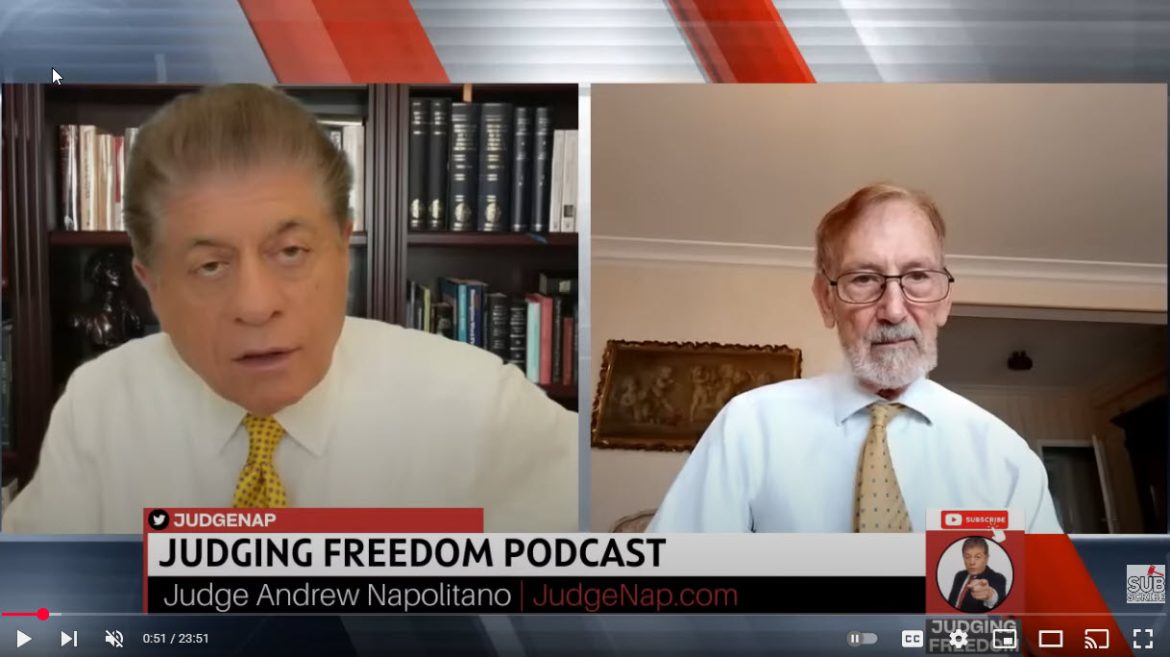The ongoing Ukraine-Russia conflict remains a focal point of global tension, with recent peace talks in London unraveling as key diplomats, including U.S. Secretary of State Marco Rubio, withdraw at the last minute. Judge Andrew Napolitano, hosting the podcast Judging Freedom, engages Professor Gilbert Doctorow in Brussels to dissect the latest developments, including the geopolitical ripples following Pope Francis’s passing and the stalled negotiations between Ukrainian President Volodymyr Zelenskyy and Russian President Vladimir Putin. The discussion reveals a complex web of political maneuvers, military strategies, and spiritual influences shaping the war’s trajectory.
Doctorow begins by addressing the recent death of Pope Francis, noting that European media primarily focus on the pontiff’s legacy as a “pope of the people,” debating whether his successor will be a reformer or a traditionalist. However, Napolitano probes the geopolitical significance of Francis’s passing, an angle less explored in mainstream discourse. Doctorow highlights Francis’s bold stances, particularly his 2024 call for Ukraine to “wave the white flag” and negotiate with Russia, a statement that drew sharp criticism from Ukrainian officials but was praised by Putin. Putin, who met Francis multiple times, offered warm words in his eulogy, reflecting the pontiff’s influence in Russian circles. Doctorow contrasts this with Francis’s late call for an investigation into alleged genocide in Gaza, suggesting that the pope’s actions often came too late to effect change, though his advocacy for peace in Ukraine remains a notable part of his legacy.
The conversation shifts to Putin’s faith, with Doctorow affirming the Russian president’s deep ties to the Russian Orthodox Church. He cites Putin’s close relationship with Patriarch Kirill and shares an anecdote about Putin’s confessor traveling with him, a practice reminiscent of European kings centuries ago. This spiritual dimension underscores Putin’s image as a patriot, a narrative that resonates domestically despite the war’s slow progress.
Turning to the peace talks, Doctorow details Putin’s recent tactical moves, including a 30-hour Easter ceasefire that caught Zelenskyy off-guard, forcing a reluctant Ukrainian compliance. More significantly, a Financial Times report reveals Putin’s willingness to concede full control over four eastern Ukrainian provinces—Lugansk, Donetsk, Zaporizhzhia, and Kherson—settling instead for the current front lines, where Russia holds varying degrees of control. This offer, described as a major concession, pressures Zelenskyy to reciprocate, but his refusal to acknowledge Crimea as Russian leads to Rubio’s cancellation of his attendance at the London talks. Doctorow suggests this move aligns with the Trump administration’s desire to distance itself from the conflict, with Rubio’s absence signaling a potential U.S. withdrawal of support for Ukraine.
General Kellogg, a neocon figure sent in Rubio’s place, is dismissed by Doctorow as a “decorative extra” unlikely to be taken seriously by Russia. The ceasefire, while a PR success for Putin, sees violations from both sides, with Russia reporting 4,000 Ukrainian breaches and Ukraine claiming 2,000 Russian violations. Despite this, Putin notes a reduction in Ukrainian attacks during the truce, indicating a temporary de-escalation.
Doctorow paints a grim picture of the war’s progress, noting Russian disappointment over its slow pace. The anticipated capture of Bakhmut, a key logistics hub, remains elusive, with Russian forces advancing incrementally to minimize casualties. The war’s nature has evolved, with drones now dominating the battlefield. Ukraine, bolstered by British-supplied drones and domestic production, poses a significant threat, while Russia adapts by avoiding mass troop concentrations to reduce drone-related losses. Casualty figures, once reported at 2,000 Ukrainian losses daily, have dropped sharply, reflecting a shift to less intense combat.
The discussion turns to the U.S. role, with Napolitano questioning whether Trump’s threat to halt military aid is serious. Doctorow believes it is, arguing that Trump seeks to wash his hands of the conflict, which he labels “Biden’s war.” However, the continued flow of military equipment and intelligence to Ukraine, often of questionable quality, provides a psychological boost rather than a strategic advantage. If the U.S. cuts off support, Doctorow predicts a collapse of Ukrainian morale, potentially leading to capitulation by year’s end. He foresees Zelenskyy fleeing the country with his allies to avoid the fallout of such a surrender, echoing Pope Francis’s earlier plea for Ukraine to end the conflict humanely.
Reflecting broader sentiment, posts on X indicate frustration with the stalled talks, with some suggesting a peace deal involving territorial concessions and a conflict freeze along current lines. Others highlight U.S. considerations of recognizing Crimea as Russian and barring Ukraine from NATO, moves Zelenskyy firmly rejects. The war, now in its fourth year, continues to escalate on the battlefield, with no ceasefire in sight, leaving the prospect of peace as elusive as ever.



